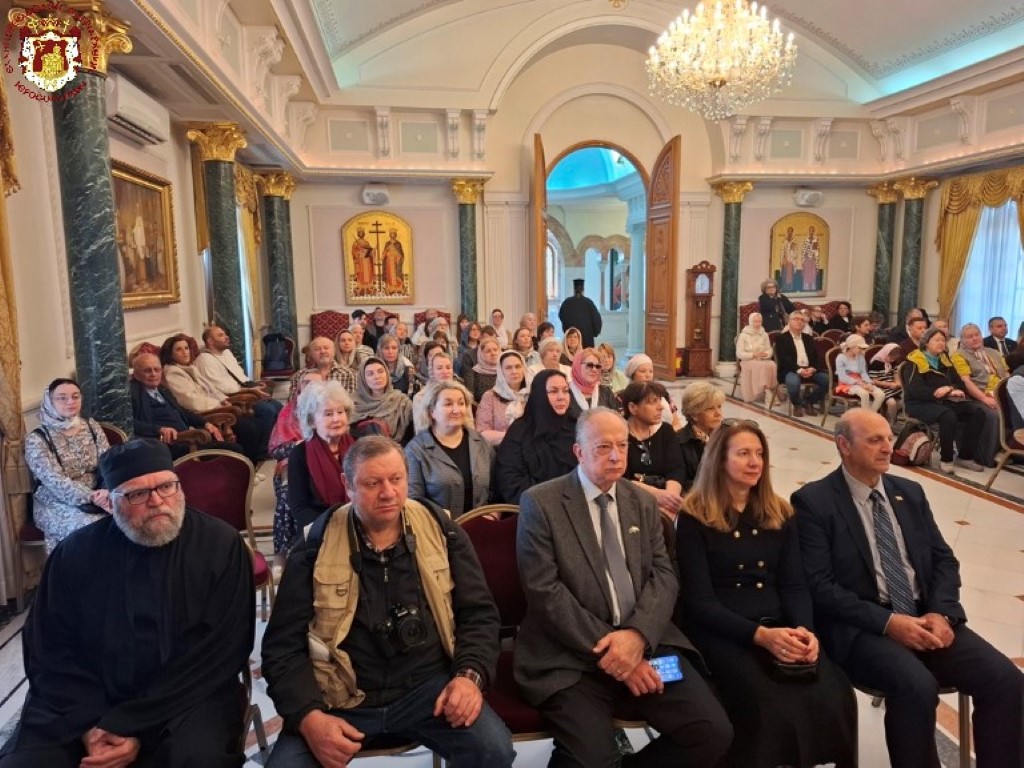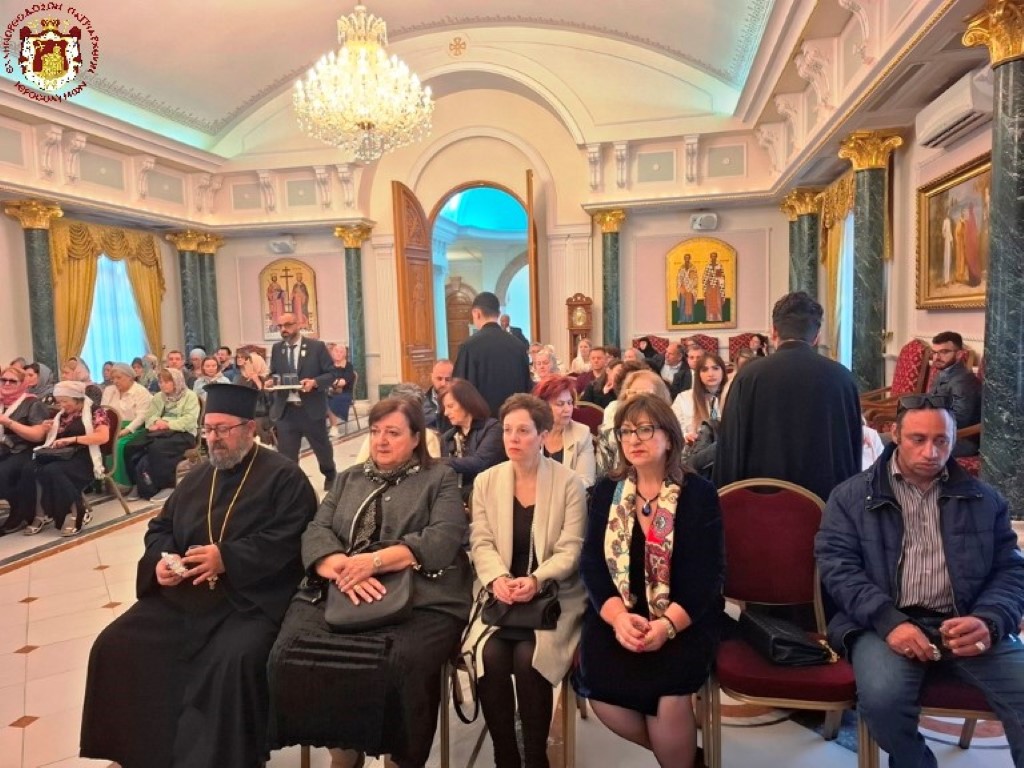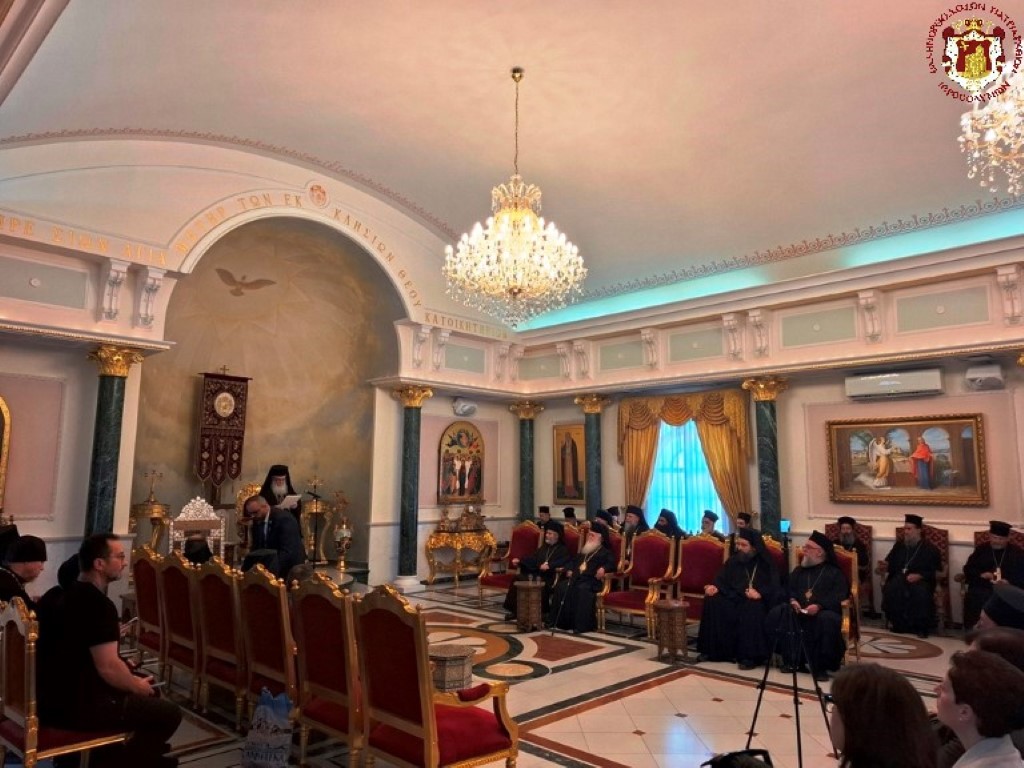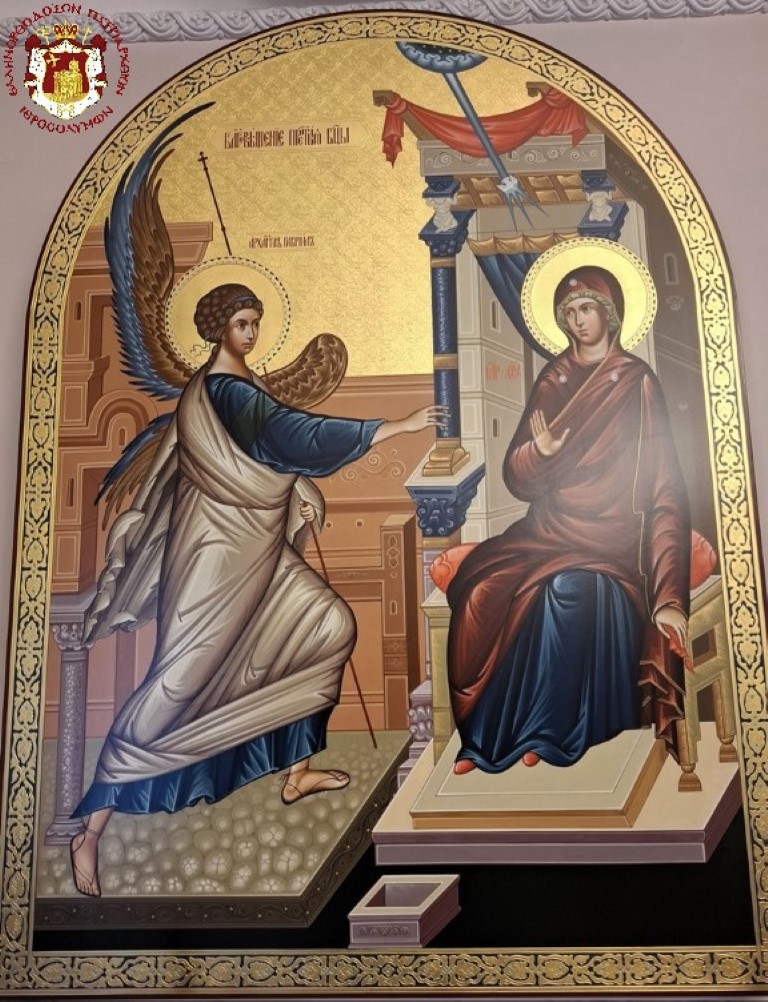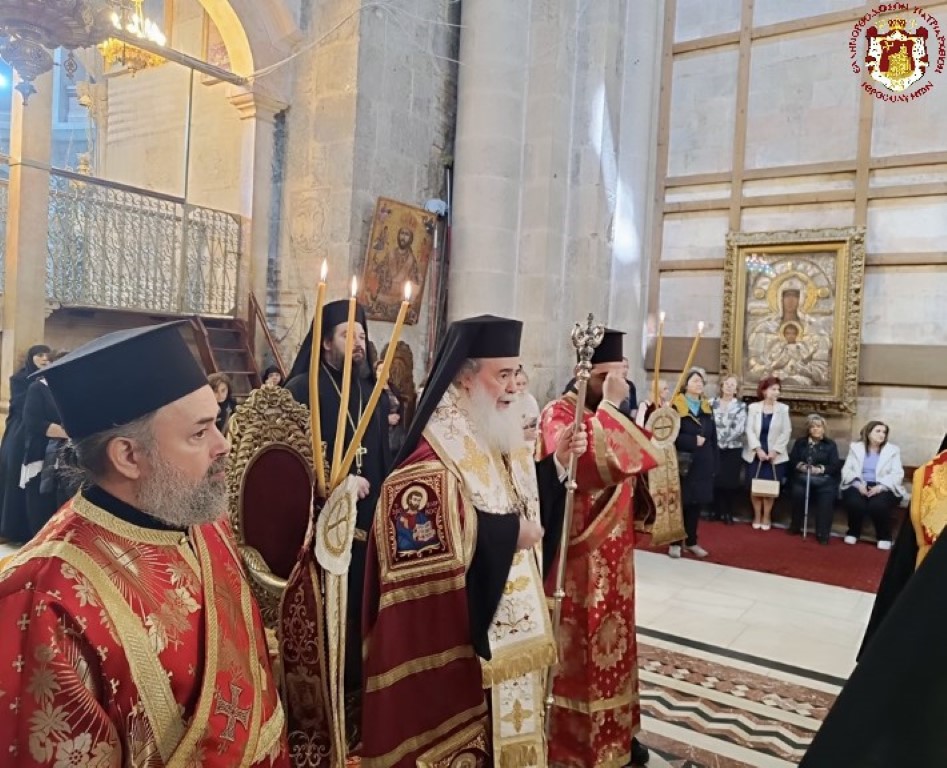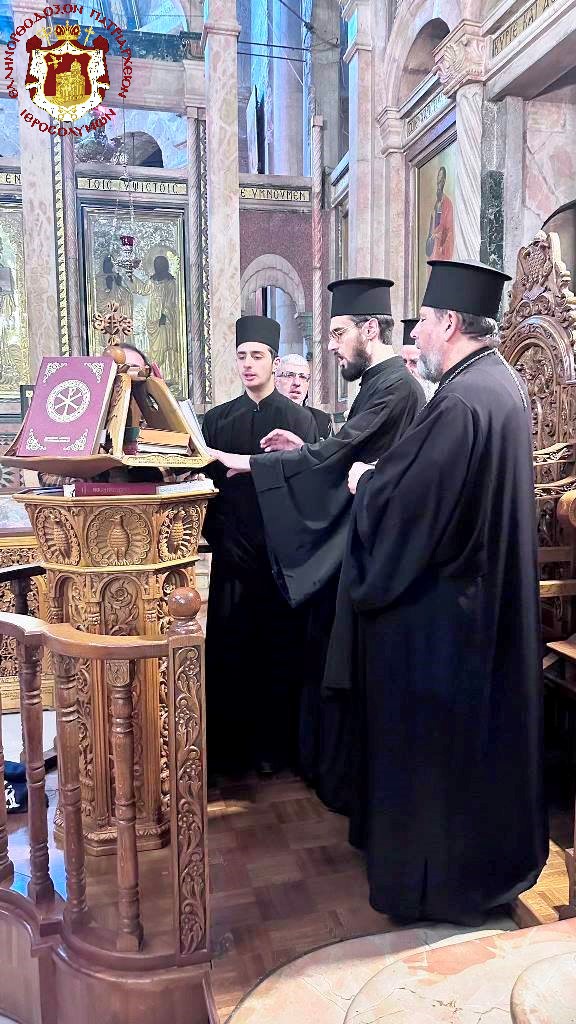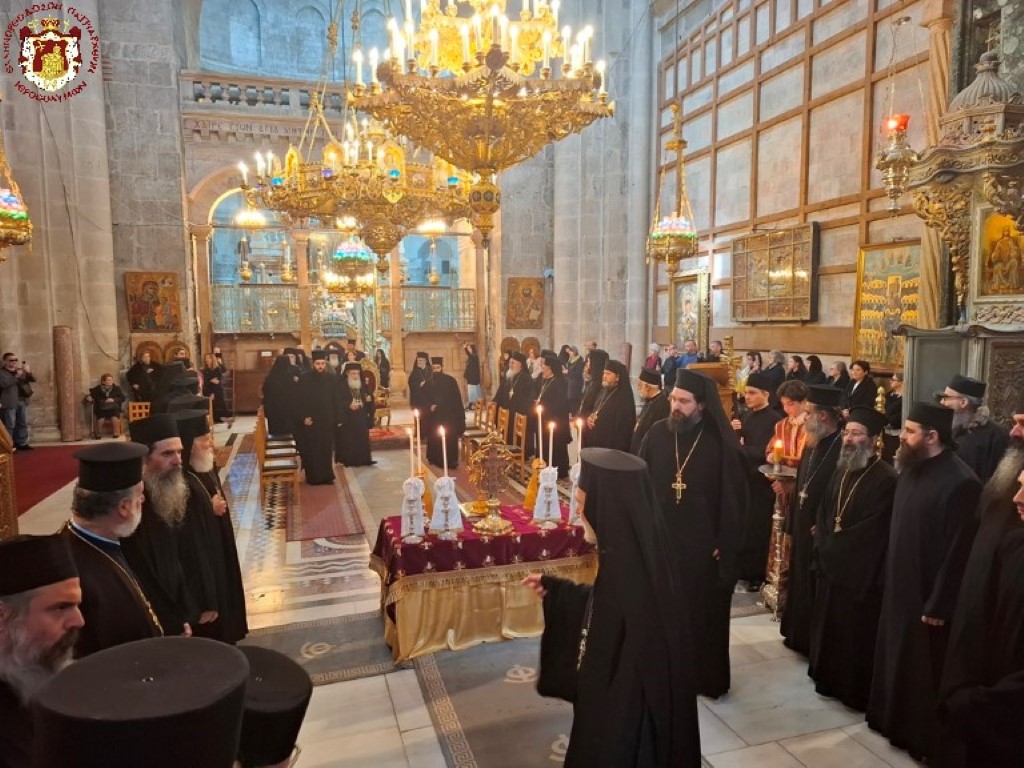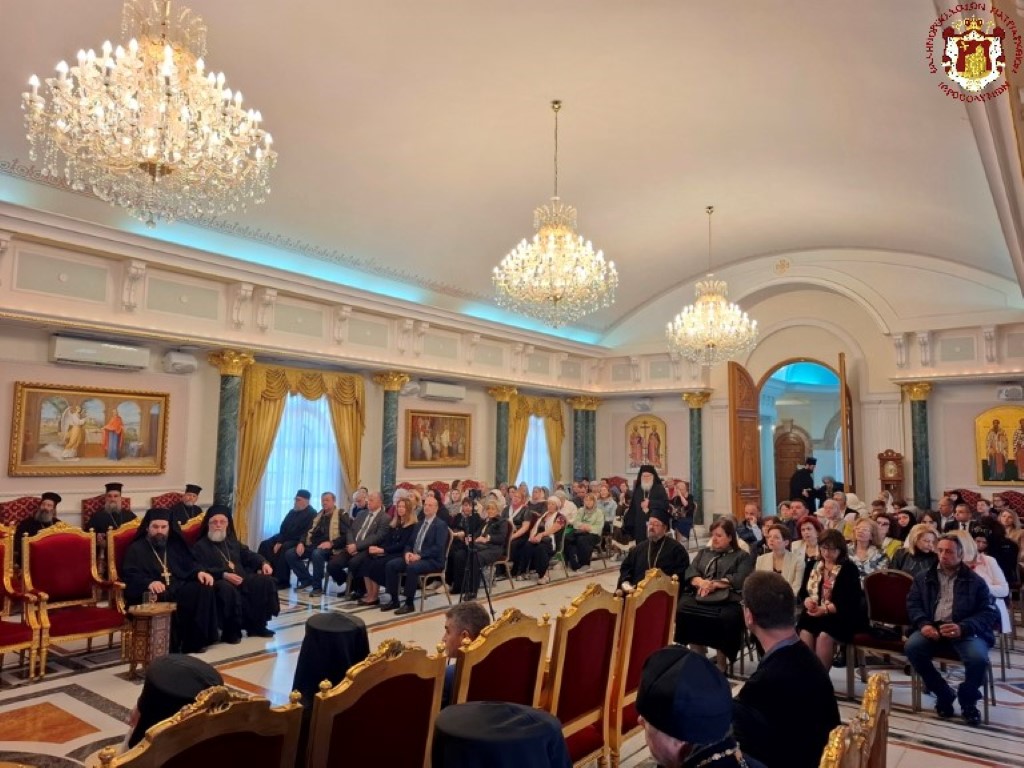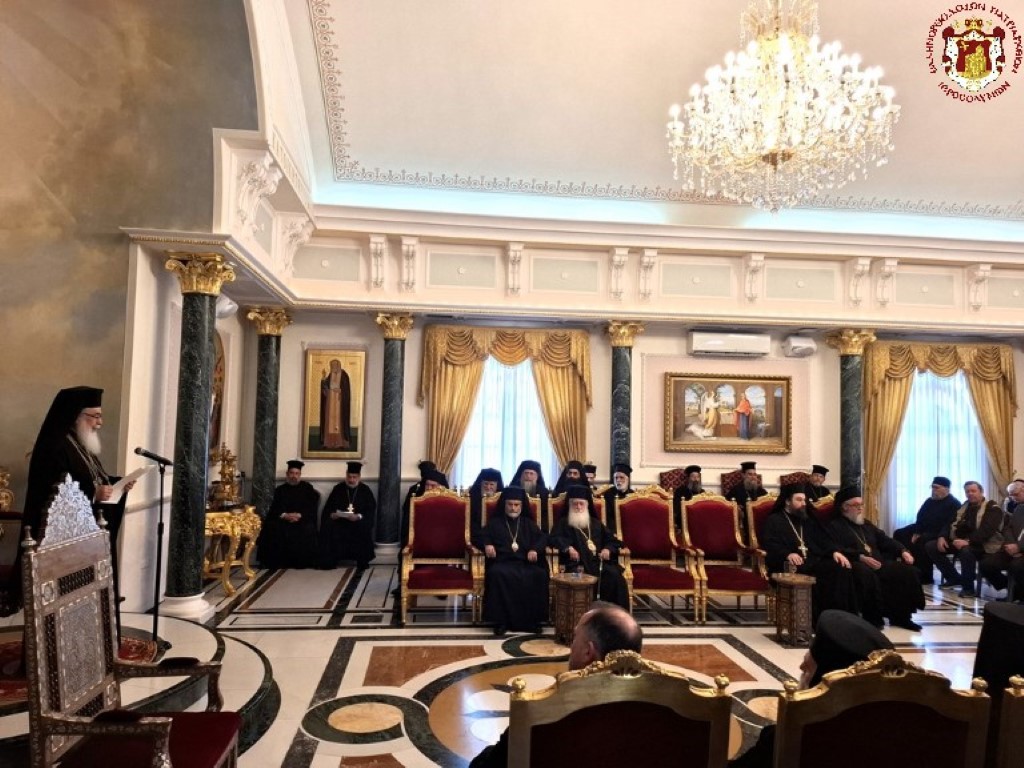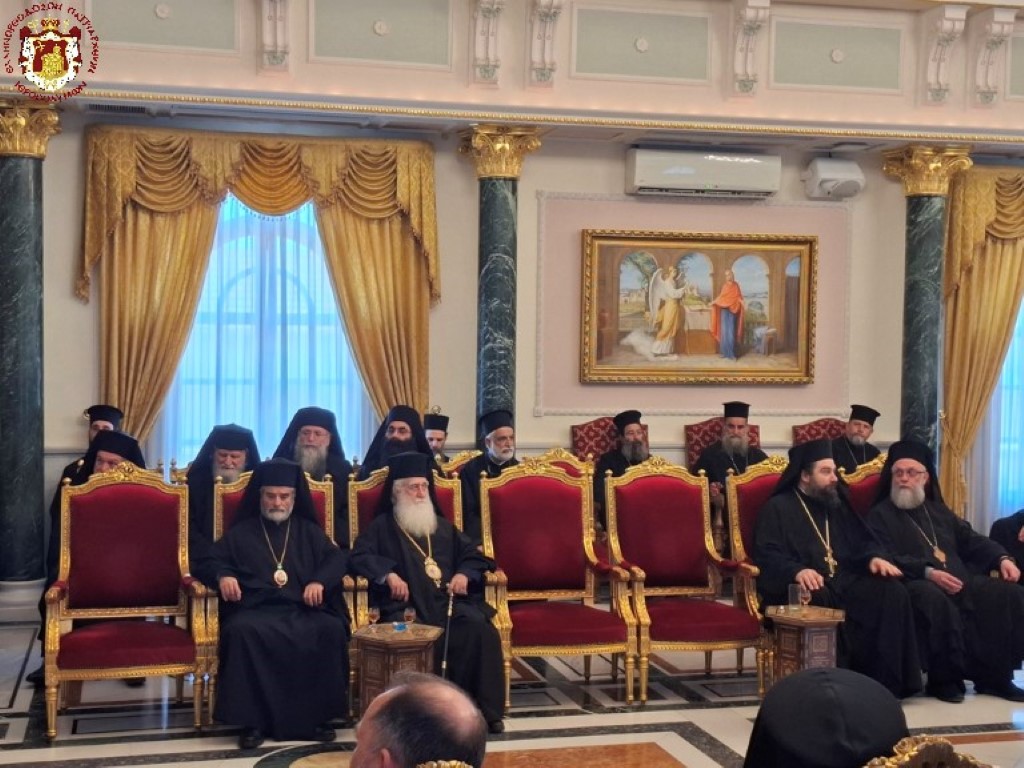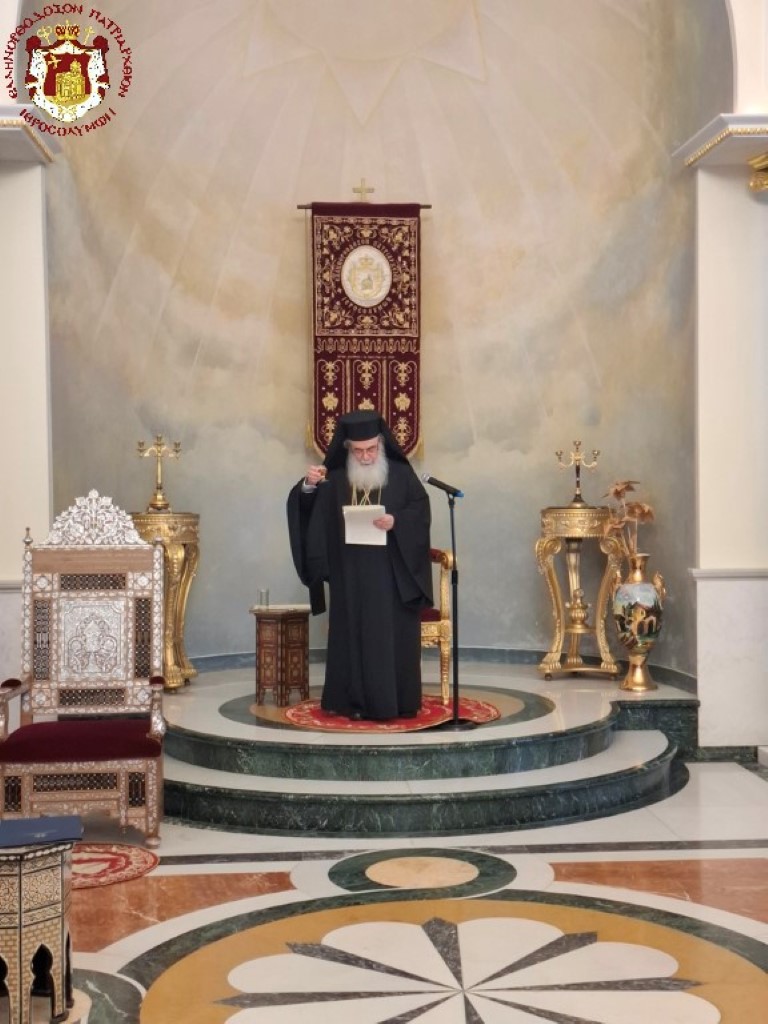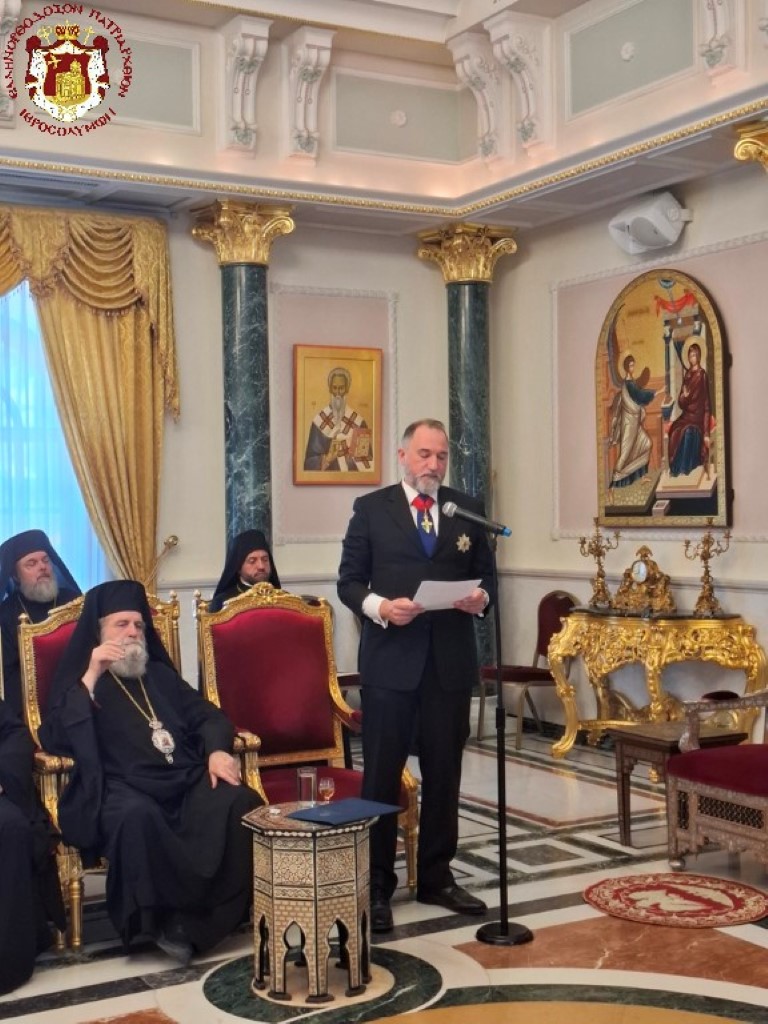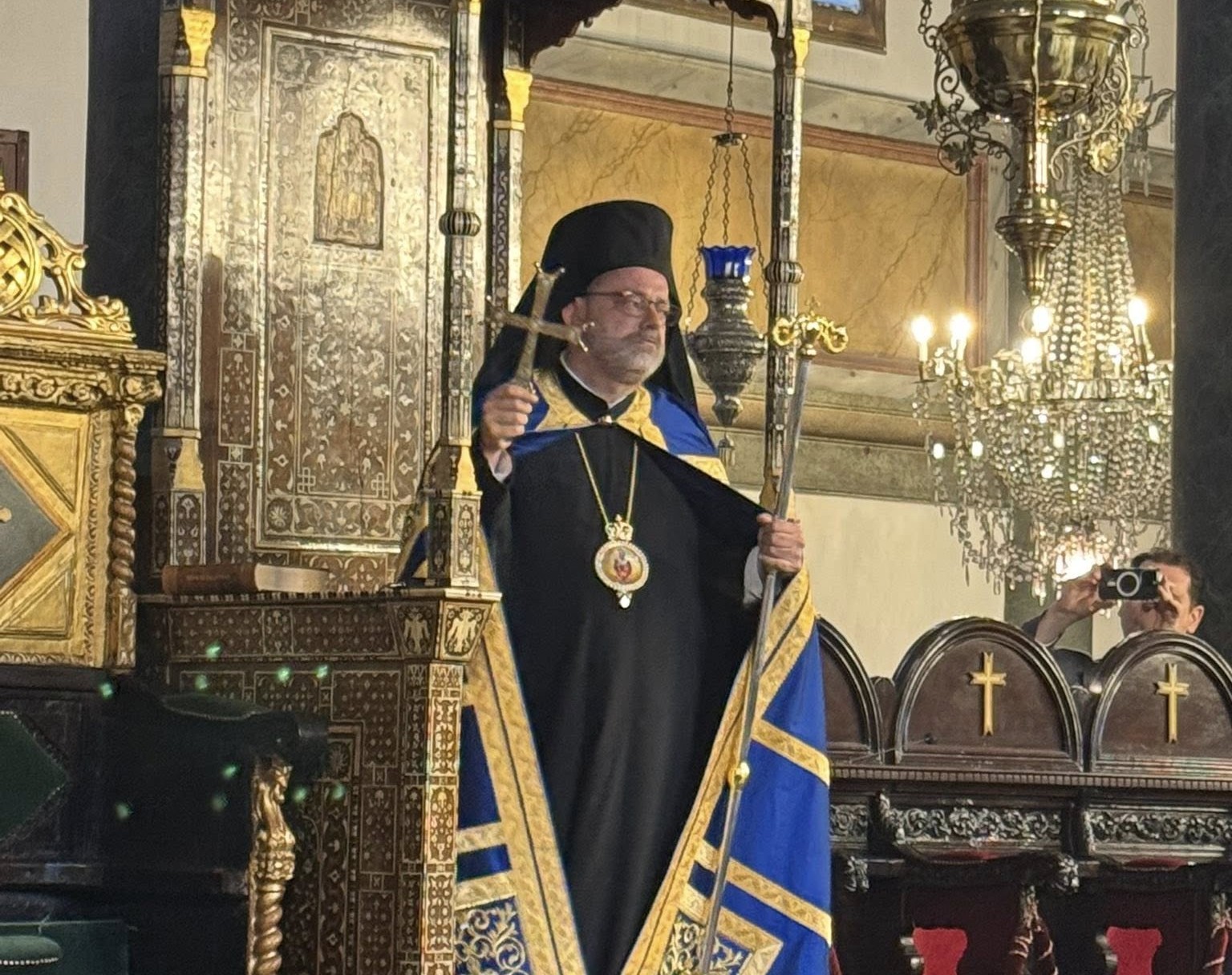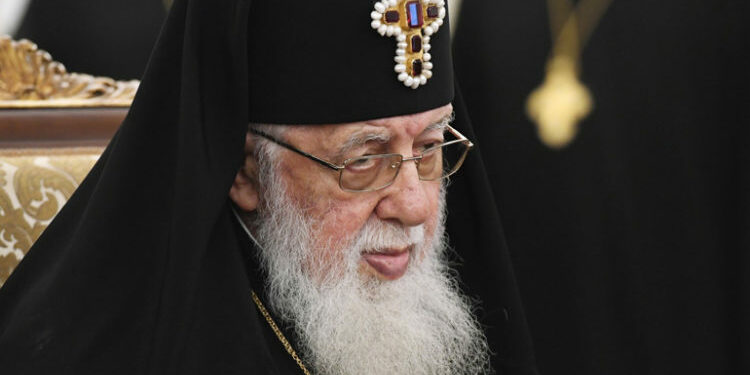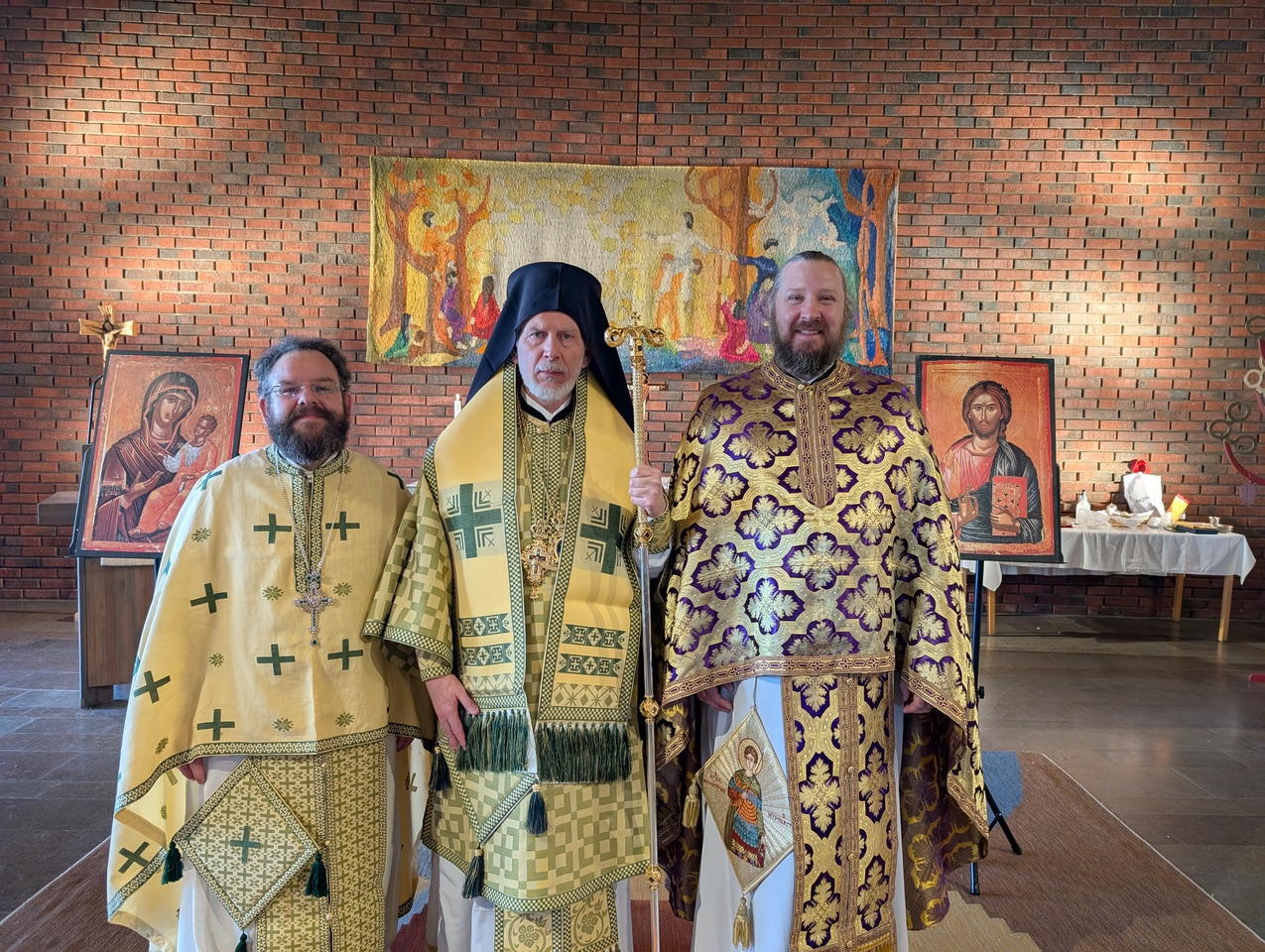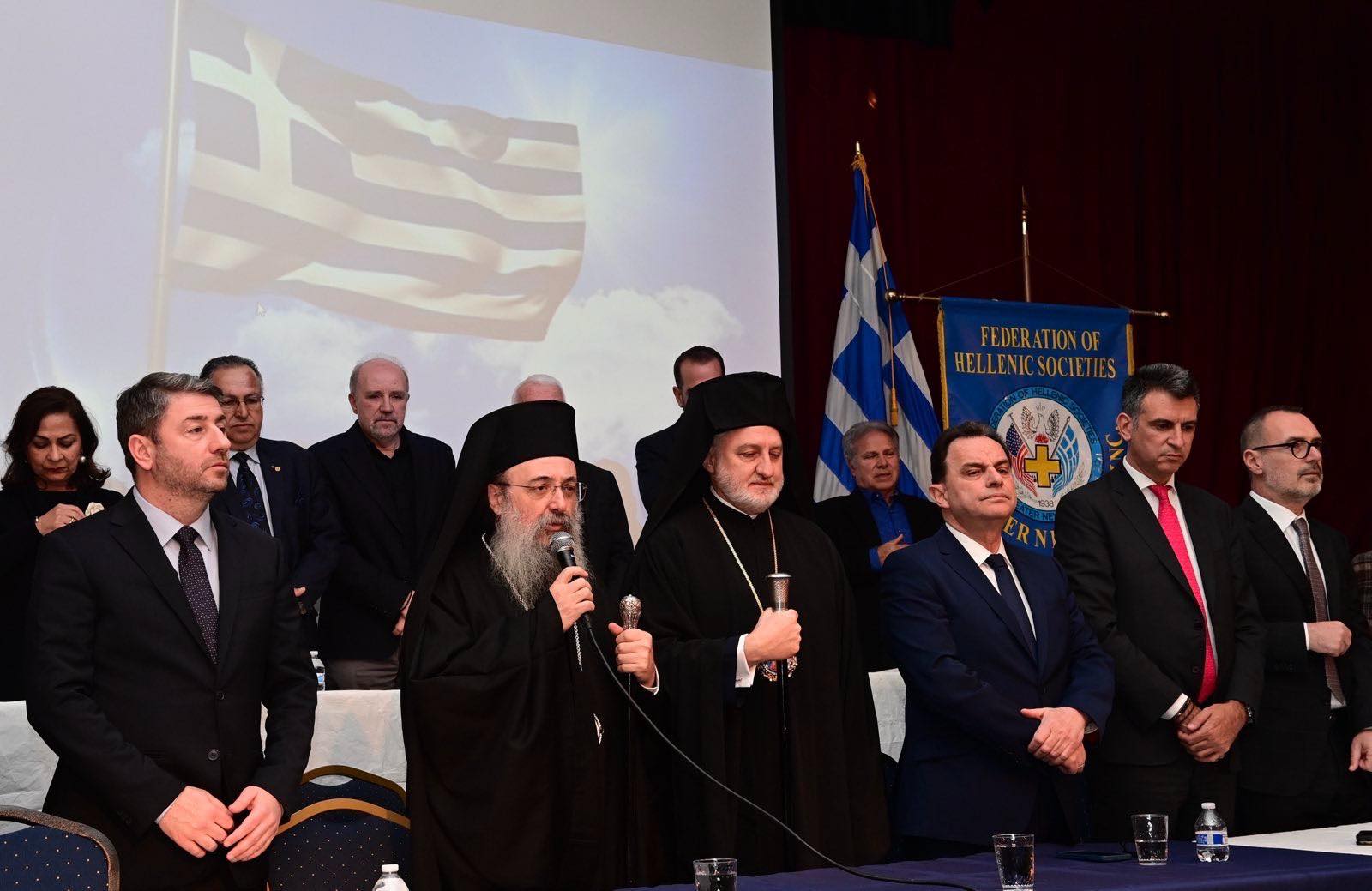Patriarchate of Jerusalem: Doxology for the National Anniversary of 25 March 1821
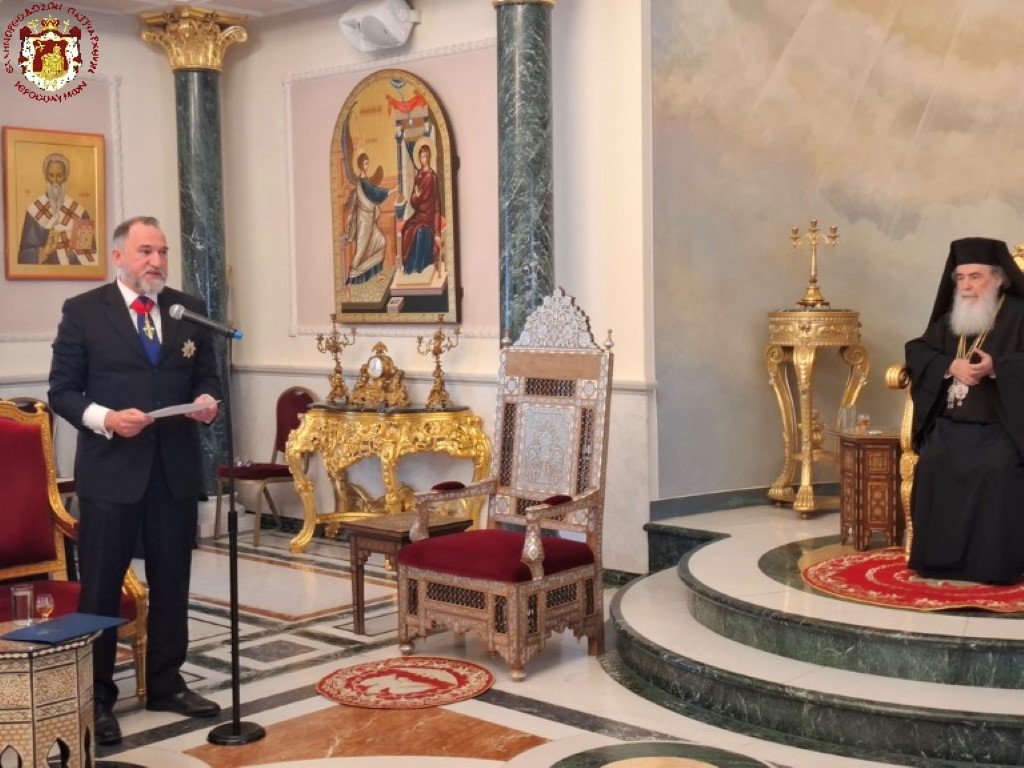
At 10:30 a.m. on Tuesday, 12th/25th March 2025, a Doxology was held at the Catholicon of the Holy Sepulchre as a thanksgiving to God for the liberation of our nation from the Ottoman yoke in 1821 and as a prayer for the repose of the souls of our fathers who fell in this struggle.
The Doxology was presided over by His Beatitude Patriarch Theophilos III of Jerusalem, with the participation of the Archbishops and Hieromonks of the Holy Sepulchre Brotherhood, the chanting of the Head Cantor of the Holy Sepulchre, Deacon Eustathios, and the students of the Patriarchal School of Sion. Present were the General Consul of Greece in Jerusalem, Mr. Dimitrios Angelosopoulos, members of the Greek Consulate, teachers of the Patriarchate’s schools in Jerusalem, local monks from Jerusalem, and a few pilgrims.
After the Doxology, there was an ascent to the Patriarchate, where a reception was held.
At this point, His Beatitude delivered the following address in Greek:
“Come with zeal in this time, to take an oath upon the Cross; raise the Cross high on the banners, and strike the enemy as with lightning bolts; let the Cross shine firm and strong over the seas, and may the enemy bow to justice.” This is the call of Rigas Ferraios in his revolutionary hymn, Thourios.
Your Excellency, Consul General of Greece, Mr Dimitrios Angelosopoulos,
Revered Holy Fathers and Brothers,
Beloved Brothers and sisters in Christ,
The anniversary of the Revolution of 25th March 1821, against the tyrannical and barbaric enslavement of the Ottomans, represents a momentous event in the national consciousness of the enslaved Greeks, driven both by their longing for the divinely gifted good of freedom and independence. For this reason, the Revolution of 1821 is recognised as a unique event in world history.
The revolutionary slogan of Theodoros Kolokotronis, the Elder of Moria: “Now the struggle is for the holy faith of Christ and for the freedom of the homeland,” clearly demonstrated that the initial motivations for the struggle to cast off the Ottoman yoke were rooted in the noble moral Greek-Christian values of faith in God and the sanctity of the institution of the homeland, as it is similarly expressed in the preaching of the Apostle Paul: “Ye are bought with a price; be not ye the servants of men.” (1 Corinthians 7:23), and “God hath made of one blood all nations of men for to dwell on all the face of the earth… and hath determined the times before appointed, and the bounds of their habitation.” (Acts 17:26).
On the other hand, the Bishop of Old Patras, Germanos, who proclaimed the beginning of the liberation struggle of the “Greek slaves,” blessing and raising the Banner of the Revolution on 25th March 1821, the day of the Feast of the Annunciation of the Theotokos, listened to the divine command of the Apostle Paul: “Stand fast therefore in the liberty wherewith Christ hath made us free, and be not entangled again with the yoke of bondage.” (Galatians 5:1).
The grandeur of the Revolution of 1821, which sealed the modern history of Hellenism, is a miracle based not on external ideological forces, but on the self-awareness of the Greek Orthodox Christian spirit of its fighters and martyrs. This spirit formed the essence of the Revolution.
It has been rightly said that the year 1821 is “a striking, spiritual vision, a world that fulfills the highest duty of liberty without ever withdrawing its gaze from Heaven.” This is testified by the motto of Dimitrios Ypsilantis: “Either we will win today, or we will die.”
The distinguishing feature of the Revolution of 1821 is that personalities arose, becoming examples of patriotism and martyrs of faith. Therefore, the year 1821 remains “a light to them that sit in darkness and in the shadow of death.” (Luke 1:79) In our modern world of confusion, blasphemy, pride, folly, and the desecration of the natural order and common human moral values, especially national freedom, “won from the bones of the sacred Greeks,” as the enlightened poet Dionysios Solomos wrote.
“Remarkable and unquestionable is the contribution of the Church to the national struggle for freedom, through the universal and blood-sacrificial participation of its clergy, including the members of our Holy Sepulchre Brotherhood. Well-known and unknown Hierarchs, Bishops, Hegumens of Monasteries, and countless Monks were at the forefront of the sacred struggle for the Faith and the Homeland, not only morally but also sacrificially, nourishing the tree of freedom with their martyrs’ blood.”
Our venerable Holy Sepulchre Brotherhood, gratefully honouring and dutifully participating in the sacred commemoration of the rebirth from the ashes of the pious Royal Roman Dynasty and our blessed Nation, went to the Church of the Holy Sepulchre of our Saviour Christ, where we offered hymns of thanksgiving and praise to the Holy Triune God. Moreover, we rendered fervent prayers and supplications for the peaceful repose of the blessed souls of those who heroically fought for the Faith and the Homeland, and who gloriously fell in the holy struggle of our nation.
“For all these, allow us to raise our cup and fittingly proclaim:
Long live the 25th of March, 1821!
Long live the pious and Royal Roman Orthodox nation!
Long live Greece!
Long live our Holy Sepulchre Brotherhood!”
…and in Arabic, it was delivered by Father Issa Mousleh.
Following this, His Excellency the General Consul of Greece, Mr Dimitrios Angelosopoulos, addressed the gathering with the following speech:
Your Beatitude,
Most Reverend Fathers,
Your Excellency, Mr Representative of Cyprus to Palestine,
Esteemed Fathers and members of the Brotherhood of the Holy Sepulchre,
Honourable compatriots and friends,
The struggle that began in 1821 represents the most glorious epic and the defining milestone of modern Greek history. After a long and dark period of oppressive tyranny, it led to the longed-for freedom and national rebirth, the establishment of an independent and sovereign state, and the beginning of a new era in the long historical journey of Hellenism. It was a struggle that was long, harsh, and uncertain, demanding countless sacrifices before it succeeded.
The shining pages of the history of the Greek War of Independence continue to impress, move, and inspire. The heroism and dedication of the fighters, both famous and unknown, in fulfilling the national ideal achieved what seemed impossible: victory against an empire. And this was in an era when the international order in Europe, after the Congress of Vienna, prioritised maintaining autocracy and suppressing any revolutionary movement, whether social or national, that would oppose it. The success of the Greek Revolution thus brought new dynamics and broader developments in the course of European history.
However, beyond its heroic examples, the history of the struggle for freedom offers lessons that remain invaluable to this day. Among these, the following stand out: First, the importance of patient and prudent preparation and the optimal use of available resources, especially when they are limited. Second, the mobilisation of all available forces of Hellenism, both within and beyond Greece. Third, the careful political and diplomatic utilisation of any changes and opportunities offered by the international situation. Fourth, a harsh lesson: the need for unity, the lack of which repeatedly threatened the survival of the Revolution. Lastly, the belief in higher ideals which inspire courage and self-sacrifice.
For indeed, the Greek Revolution was not only a national liberation movement but a struggle aimed at principles and values identified with Hellenism since ancient times, which have consistently formed the foundation of its unique example and contribution to the human experience. From the outset, the struggle was associated not only with the ideal of self-determination for nations but also with individual freedom and dignity, the primacy of Law and Justice, and the equality of all before them. These principles were established, from the very first year of the Revolution, in Constitutions that were among the most progressive and liberal of their time, which gave birth to the great political tradition of modern Greece and expressed politically the fundamental Greek and Christian moral values.
Your Beatitude,
We are undeniably living in a period of fluidity and tendencies toward the deregulation of the international order, with still unpredictable consequences. In our region, despite our hopes, the war continues into its second year, with unabated intensity and human suffering. In this adverse and dangerous environment, the application of the lessons from the 1821 struggle is even more timely, and our commitment to the principles and values that inspired it is all the more necessary.
Greece, with the confidence granted by its course over the two centuries since the Resurrection, is in a position to work, with the same dedication, to defend and promote these principles and values and to preserve the spiritual heritage that forms the foundation of the identity of Hellenism. In the same spirit, it remains committed to safeguarding the heritage and rights of the Patriarchate of Jerusalem, as well as protecting the Christian communities of the Middle East.
Grateful for the precious privilege of celebrating our national anniversary in Jerusalem with the Doxology that you earlier held, Your Beatitude, we wish for peace to finally come and take root in the Holy Land. Faithful to its values and historical course, the Hellenic Republic will continue to strive in this direction, just as you do, serving with dedication the ideals of peace and justice.
Many happy returns. Long live Greece.
Dimitrios Angelosopoulos
Jerusalem, 25th March 2024
Finally, all received the blessings and prayers of His Beatitude.
From the Secretariat-General
Source: Patriarchate of Jerusalem
